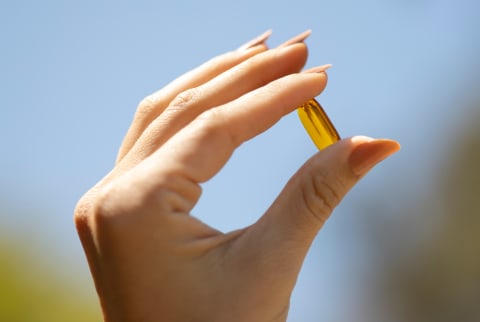But when we talk about increasing our vitamin D intake, it’s helpful to be clear about the specifics of what we mean, exactly. After all, the body doesn’t use all types of vitamin D in the same way; it prefers one kind over another. Although our bodies can produce some vitamin D on their own with exposure to sunlight, spending too much time inside is not the main reason D deficiency and insufficiency rates are 29% and 42% among U.S. adults2, respectively. With only a handful of foods containing a significant amount of vitamin D (or any at all), getting enough of the essential fat-soluble vitamin from diet alone just isn’t realistic. Truthfully, the most effective way to get your levels up is to take a high-quality daily vitamin D supplement. (Don’t worry, we’ve vetted and compiled the best options for you.) mindbodygreen recommends an efficacious dose of 5,000 IU of D3 daily for adults to achieve (and more importantly, sustain) optimal levels of 50 ng/ml.* If you’re interested in finding out if you’re getting enough vitamin D or if your supplement is actually working, you can have your doctor order a serum total 25-hydroxyvitamin D blood test, aka 25(OH)D for short. (And if you have stubborn vitamin D levels, check out these 10 possible contributing factors.) If you’re wondering if you can skip the vitamin D and still bolster whole-body health—think again. Vitamin D is crucial for your bone, teeth, muscle, immune, and skin health (to name a few).* It regulates the production of thyroid hormones, nurtures a healthy pregnancy, promotes gut health by supporting beneficial gut bacteria, regulates mineral balance and promotes bone density, contributes to longevity, and even supports cognitive function and mood.* The fat-soluble nutrient is deemed “essential”—and for good reason. Vitamin D2 and vitamin D3 also differ structurally—i.e., D3 is far more stable and therefore has superior bioactivity and bioefficacy (more on that later).* Although generally found in animal products, there’s one very important caveat to mention: D3 can also be found in algae and lichen, which allows for a plant-based D3 supplement (although algal D3 is much more sustainable for the environment than lichen). In a recent Frontiers in Immunology 3scientific review3, researchers determined D2 and D3 influence the expression of genes differently and, therefore, affect the immune system in overlapping but different ways. Some of the findings of this research indicate that it is possible D2 supplementation could even counteract the benefits of D3 intake. The message is that we really don’t know the full extent of the differences between D2 and D3 (but we know quite a bit; read on to learn more). D2 is significantly less effective because of the structural differences that affect the way the body metabolizes5 the vitamin. Vitamin D2 also has increased catabolism3 (i.e., it’s broken down, or metabolized, more quickly) and its metabolites have weaker binding affinity3 to the vitamin-D-binding protein (i.e., the major vitamin D transport protein that carries the nutrient to the rest of the body to confer all those wonderful health benefits we highlighted before). “These two nutrients are not biologically equivalent or interchangeable,” Ashley Jordan Ferira, Ph.D., RDN, mbg’s vice president of scientific affairs, previously wrote for mindbodygreen when dissecting D3’s scientifically proven superiority over D2. “One is effective (vitamin D3), and the other is way less effective (vitamin D2). Any suggestion that vitamin D3 and D2 are both good options falls into the ‘bad science’ bucket.” When it comes to bioactivity, vitamin D3 has been shown to raise free 25(OH)D levels—an up-and-coming biomarker that may be more sensitive than total 25(OH)D—with greater efficacy than D26. “This is yet one more compelling piece of evidence cementing the superior bioefficacy of D3 over D2,” Ferira concludes. Overall, if you’re looking to increase your vitamin D levels and experience the myriad benefits of sufficient D status, vitamin D3 is the way to go. “Supplementing with D3 instead of D2 will give a greater likelihood of significantly changing vitamin D levels in the body,”* shares registered dietitian Maya Feller, M.S., R.D., CDN, of Brooklyn-based Maya Feller Nutrition. mindbodygreen leverages sustainable, organic algae in vitamin D3 potency+ (plus, there’s a trio of organic avocado, flax, and olive oils for built-in absorption advantage!), making it the perfect supplement for plant-based individuals and omnivores alike.* To experience the sweeping benefits of this sunshine vitamin, taking 5,000 IU of vitamin D3 paired with a fat (for optimal absorption) is the best option. Because of the limited food sources of vitamin D3 (especially for plant-based eaters), taking a high-quality vitamin D3 supplement, like mbg’s vitamin D3 potency+, is the easiest and most effective daily ritual to increase your vitamin D levels (and keep them there).*




